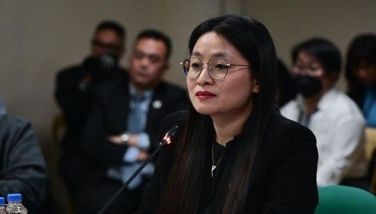I’m a free man – Jalosjos
Former Zamboanga del Norte congressman and convicted rapist Romeo Jalosjos insisted yesterday that he is a free man, saying he was indeed released and has the papers to back up his claim.
But Palace and justice officials claimed that his time served in prison is incomplete and defended President Arroyo’s decision to stop his release, citing procedural lapses and public interest as the main reasons.
In a lounge at a tennis court outside the main prison facility but within the New Bilibid Prisons (NBP) complex, Jalosjos, accompanied by bodyguards, showed media his release order and maintained that his status as an inmate should be reviewed.
“Around
Jalosjos’ house is located along
Jalosjos said that he was just cooperating when he showed up again at the NBP premises, and was giving way to the request of the DOJ for a review of his sentence.
Asked why he did remain “outside” since he claims that he is already a former prisoner, Jalosjos said, “Why will I risk confrontation? There is a misunderstanding. There is a misinterpretation as to the computation of the sentence I already served. Things will all the more get out of hand.”
He likewise expressed confidence about the computation (of his sentence) made by former Bureau of Corrections (BuCor) Director Vicente Vinarao and his successor Director Ricardo Dapat.
“In my case, there is no need for a recommendation or a request from any other office. Director Dapat had just implemented what was needed to be implemented. I had to be released. He is just doing his job otherwise, he can be charged with arbitrary detention,” Jalosjos explained.
But Justice Secretary Raul Gonzalez thought otherwise. “The release was premature because it was not approved by the DOJ. Political consideration here is something that you cannot ignore,” he said.
Gonzalez said President Arroyo was “very upset” when she heard that Jalosjos was being released last Sunday.
“The President was upset because she felt that her policy of 70 was being ignored,” he said.
Good behavior
Jalosjos cited good conduct time allowance as the reason his sentence was substantially reduced, eventually making him eligible for release.
NBP officials explained that if a prisoner shows good behavior during the period of evaluation, he or she is given what is called a good conduct time allowance of 15 days. This means his sentence is reduced by 15 days.
“Add to this the ‘penal colonist status’ which I gained after it was approved by the NBP Classification Board last March 13, 2007. This meant reduction of an additional five days to what has remained of my sentence,” Jalosjos said.
A colonist status is obtained if an inmate showed good behavior while inside prison or if he has not violated any rule or regulation inside.
As a “living-out” prisoner, Jalosjos has the privilege to go out of his detention cell every now and then but must remain within the NBP premises.
He also expressed optimism that something good will eventually come out of this and that the Justice department will realize that the computation of his served sentence is correct and recognize him as a free man.
“I might file an appropriate case at the lower court if nothing happens. I am ready to contest them and defend the computation of the Bureau of Corrections. The BuCor order should be respected,” he said.
Prior to the reported “release,” Bureau of Corrections Director Ricardo Dapat said Jalosjos may be released without the necessary documentation signed by President Arroyo.
“This type of release applies to Mr. Jalosjos. Upon review of the records section of our office of Jalosjos’ case, it was found that he can now be released from prison,” he said on Saturday, a day before Jalosjos was scheduled to be released.
Dapat claimed there is no need to coordinate with the Board of Pardons and Parole, or even with Malacañang, since the former lawmaker has already substantially served his sentence.
A copy of Jalosjos’ “Certificate of Discharge from Prison” dated
Dapat was not available for comment Sunday when Malacañang and the Department of Justice blocked the release of the controversial convict.
Meanwhile, National Security Adviser Norberto Gonzales denied speculations that he was behind efforts to release Jalosjos, whose relatives in government are members of his party, the Partido Demokratiko Sosyalista ng Pilipinas.
He said he has been hearing such rumors months ago but “they’re not true.”
Chief Presidential Legal Counsel Sergio Apostol said Mrs. Arroyo saw a public clamor against releasing Jalosjos, who was sentenced to double-life imprisonment. His sentence was reduced to 16 years by the President earlier this year.
In the midst of the confusion, an insider at the NBP confirmed that Jalosjos indeed went out of prison because there was a release order.
“There was just confusion because it is possible that the Justice department could only be taking note of the good conduct time allowance and did not take into consideration Mr. Jalosjos’ colonist status.”
The source said Jalosjos only returned because he wanted to cooperate and didn’t want things to go out of hand. Jalosjos now refers to himself as a “visitor.”
Bizarre
Not to be outdone, senators criticized yesterday the government’s “flip-flopping” policy over the commutation of Jalosjos’ sentence.
Senate President Manuel Villar Jr., Senators Miriam Defensor Santiago, Jinggoy Estrada, Pia Cayetano and Richard Gordon were all baffled by the conflicting statements coming from the Palace, Department of Justice and the NBP over the contentious release of the former lawmaker.
“I don’t know why the President kept on changing her mind. Of course it’s embarrassing to the person who was freed. You should not pardon him or her instead,” Villar said.
While acknowledging that it is the right of the President to give pardon to any convict, he said what he disliked most was the “changing of decisions,” which is not fair to the persons concerned.
Sen. Jinggoy Estrada said Jalosjos’ case should not be compared to the case of his father, former President Joseph Estrada, whose case was “political in nature.”
“My father did not rape anyone,” Estrada said.
“This is highly unusual that there were certain documents purporting to authorize the release of a convict and then the highest authorizing person, the President, denied any veracity to the release of the convict,”
“The issue then is not merely whether his (Jalosjos’) sentence has been commuted, or that he could be released this year or some other time, but where did these documents come from? And if the Presidents says that she never authorized them, then who authorized them?” she said.
The person who authorized the documents should be held accountable because it was clear that he was acting outside of his jurisdiction.
“If there were signatures on the documents pertaining to the release, then either those signatures were authentic and those who signed are criminally liable for excess or abuse of authority; or, if the signatures were forged, then it was a public forgery, and should therefore be investigated by the NBI,” said Santiago, who urged the National Bureau of Investigation to look into the controversy.
At the same time, Cayetano questioned the conflicting pronouncements of the BuCor and the DOJ over the real date of eligibility for pardon of former Jalosjos.
“Why the confusion over the pardon dates for Jalosjos? Doesn’t the BuCor coordinate with the DOJ, and the latter with the Office of the President? Isn’t there any existing, clear-cut policy on this matter? If anything, the conflicting statements indicate a sly attempt to rush his release for political expediency.”
Cayetano said she does not question the power of the President to pardon and commute sentences of convicted prisoners, but maintained that the Arroyo administration owes the pubic an explanation on its policies on pardon and commutation of prison sentences.
Esperon recalls face-off
At Camp Aguinaldo, Armed Forces of the Philippines chief Gen. Hermogenes Esperon Jr. said the commutation of the double-life sentence on Jalosjos brings back memories of the daring assault he led on an island in Bataan to capture the fugitive former Zamboanga del Norte representative.
Esperon, who was then a colonel assigned as deputy chief of the Presidential Security Group at the time of the assault on Jalosjos’ hideout, said that upon learning of the commutation of sentence, all he thought was that despite the odds, he did his best to enforce the law.
He said although he may have some questions with regard to the commutation of the sentence, all that is important to him was he did what he could to arrest him.
He even vowed that should Jalosjos be released from prison, and commit another violation of the law, he would not hesitate to arrest him again.
The AFP chief also recounted how his team assaulted the island in
“When we got him on the island, I used three watercraft, one maneuvering to the right, one maneuvering to the left, my team was at the center, with all the risk, they have guns but they were cornered,” he said.
He said there were a number of his men, including himself, who almost got wounded or killed during the operation, but according to him, it did not matter much now, as what was more important was to do his best to enforce the law and accomplish the mission.
Jalosjos was convicted in 1997 on two counts of statutory rape and six counts of acts of lasciviousness under the Revised Penal Code. His victim was an 11-year-old girl.
He was initially sentenced to two life terms and was ordered to pay P400,000 in civil indemnity and P400,000 in moral damages. – Paolo Romero, Christina Mendez, Helen Flores, James Mananghaya, Mike Frialde
- Latest
- Trending


























